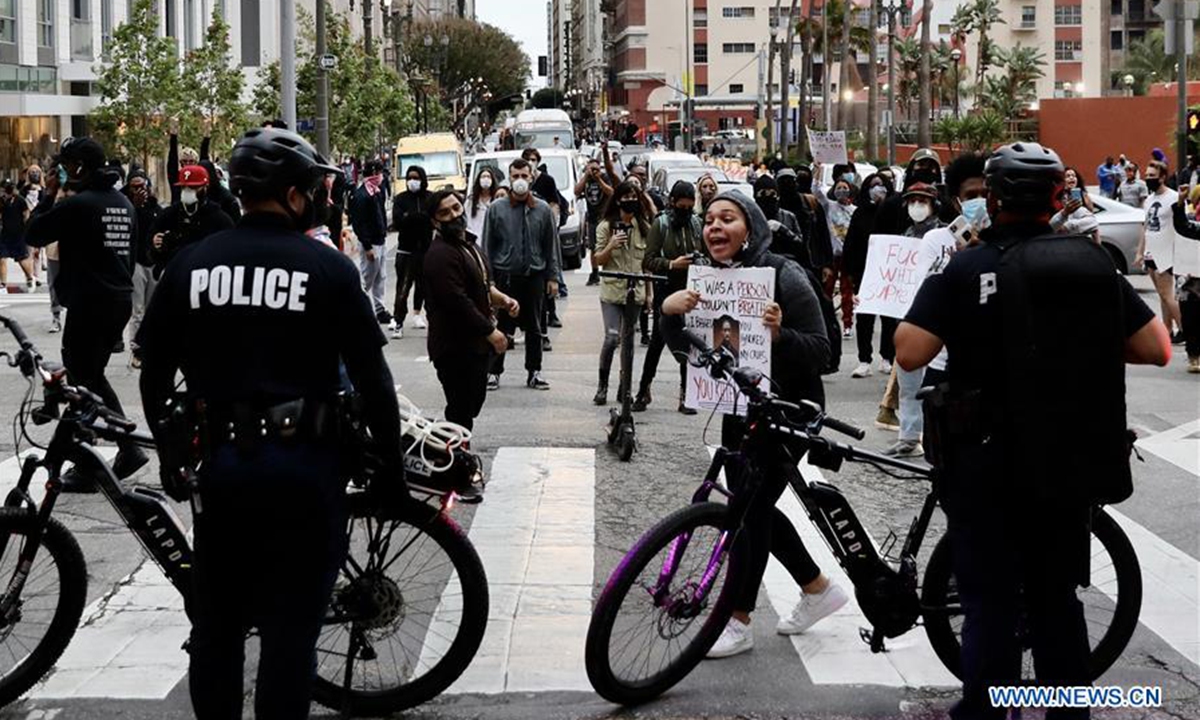
Protesters march on a street in downtown Los Angeles, the United States, May 29, 2020. Hundreds of people were arrested Friday night and early Saturday after protests against police brutality turned violent in downtown Los Angeles. (Xinhua)
US lawmakers have been working on reforming policing policies, amid rising concern over police brutality in the nationwide protests following the death of black man George Floyd in police custody.
In Minneapolis, where four former police officers were charged over their involvement in the death of Floyd, four City Council members on Monday outlined a plan that saw community-based programs as a replacement for police department.
The city council on Sunday voted to dismantle the Minneapolis Police Department (MPD), which has long been accused of racism.
According to the newly-proposed plan, the community-based programs will focus on reducing violence and limit the need for an armed law enforcement response.
The reform could take a year before a new apparatus for public safety takes form, a council member said.
"Decades of police reform efforts have proved that the Minneapolis Police Department cannot be reformed, and will never be accountable for its actions," members of the council said in a statement.
Floyd died on May 25 at the hands of four officers of the MPD, with one of them keeping his knee down on Floyd's neck for almost nine minutes. All of the four officers have been fired, facing criminal charges.
In Albany, New York State lawmakers on Tuesday voted to repeal a decades-old provision that had kept police officers' disciplinary records secret, making the records and misconduct complaints transparent.
The measure is among a package of bills at the state legislature targeted at addressing police brutality. On Monday, the lawmakers already passed bills to ban chokeholds in law enforcement -- as was applied in Floyd's case -- and make false race-based 911 reports a hate crime.
On a national scale, Democratic leaders of the US House and Senate on Monday introduced legislation aiming to reform policing policies in the country.
The legislation, led by the Congressional Black Caucus, was announced at a news conference attended by Chair of Congressional Black Caucus Karen Bass, House Speaker Nancy Pelosi, and Senate Minority Leader Chuck Schumer, among other senior Democratic leaders on Capitol Hill.
"We cannot settle for anything less than transformative structural change," Pelosi said when introducing the bill. "Police brutality is heartbreaking reflection of an entrenched system of racial injustice in America. True justice can only be achieved with full comprehensive action."
According to the text of the Justice in Policing Act of 2020 cited by US media, the bill will make it easier to prosecute police misconduct and recover damages caused by law enforcement.
It will create a National Police Misconduct Registry, mandating state and local law enforcement to turn over data on the use of force related to such factors as race, gender, disability, religion and age, while preventing "problem officers from changing jurisdictions to avoid accountability."
The proposed law will ban certain policing tactics, require that federal police officers wear body and dashboard cameras, and set restrictions on the transfer of military-grade weaponry to state and local law enforcement.
As part of the legislation effort, House Judiciary Committee will hold an oversight hearing Wednesday on policing practices and law enforcement accountability. Philonise Floyd, George Floyd's brother, is among the witnesses to testify at the hearing.




